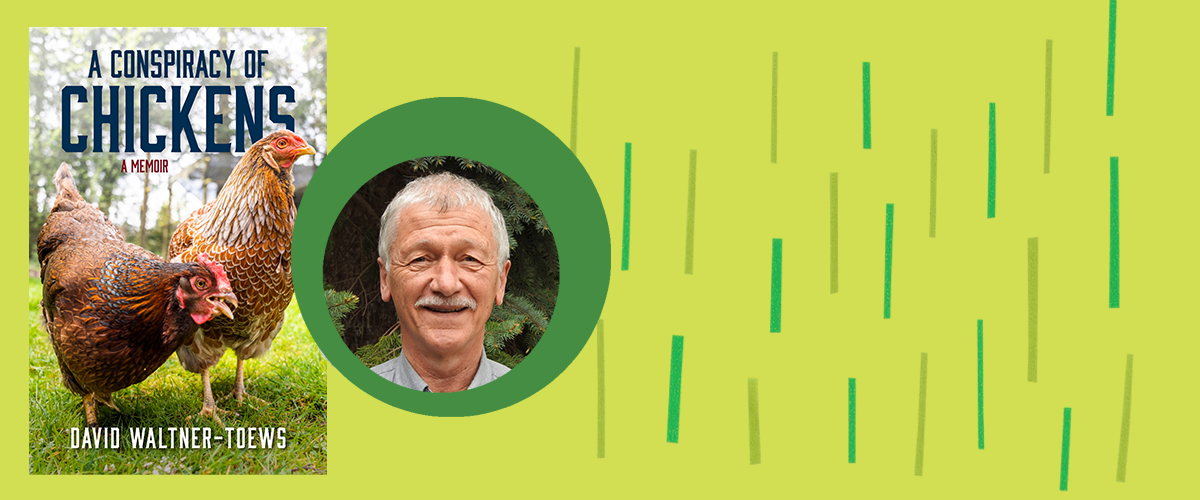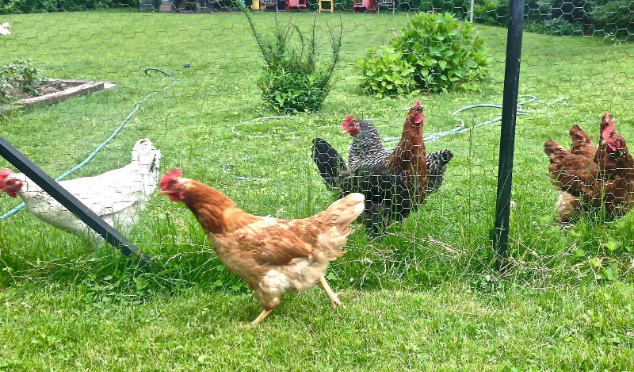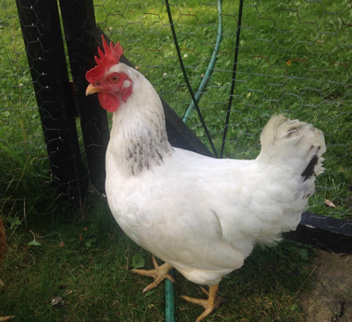
David Waltner-Toews
Had I “always wanted” chickens? No. Did I know anything at all about raising them? No. Was it legal to keep seven chickens in the city? No. Did I have any idea what lay ahead? No.
Tell us about the gift that inspired A Conspiracy of Chickens?
After 25 years of teaching and investigating the epidemiology of diseases other animals share with people, I thought I might finally have a few things worth writing about. After my early retirement from university I exhausted myself in a frenzy of writing non-fiction, fiction and poetry. I wrote about feces, eating beetles, pandemics. That was when my wife (a therapist) decided that a chicken intervention was necessary.
My wife decided that sitting at a computer for 24 hours a day, thinking about what I should be writing, or even writing, while perhaps mentally stimulating, might not be the healthiest way for me to spend my retirement. So, a few weeks before my 70th birthday, she drove me out to a hatchery in St. Jacobs. I waited in the car. She came out a few minutes later with a small box that made cheeping and scrabbling sounds. I opened the box: seven of the cutest little fuzzballs! Had I “always wanted” chickens? No. Did I know anything at all about raising them? No. Was it legal to keep seven chickens in the city? No. Did I have any idea what lay ahead? No.
Your memoir was developed from a blog post. What was the process of taking the leap from blog to memoir?
Taking care of a small flock of chickens was all new and exciting for me. I took pictures of them almost every day (as one does with all newborns), and started writing about my experiences with them and posting them on Facebook. Initially this was part of my daily writing “exercise”, a way to flex my writing and mental muscles in different ways. Turns out a lot of people found my daddy-care activities and musings entertaining. Then, my other book exercises languishing (apart from a book, On Pandemics, which was a sort of nostalgic exercise for me), I thought: I should gather these into a book. I’ve previously written books that were intended, from the start, to be books. As with the hens themselves, this was new, and I didn’t have a Julie and Julia guide to help me stay inside the lines. My first attempt at transforming daily blogs into a book was a cobbling together of the posts, along with some extra interjections and reflections about the evolution, biology and history of chickens, Chinese Zodiac, urban ecology, the nature of time, techniques for a happy retirement. I thought of this as the sort of memoir old people like me would write for their families. I called it “The Inter-pandemic Backyard Chicken Book”. I checked around to see if any publisher or agent was interested. The first few nibblers told me what I already knew: this thing had no overall narrative; it reflected my over-curious and scattered mind. Then Noelle Allen at Wolsak and Wynn said, “We can work with you to make this book.” I generally work well with good editors, which means those who use their skills to help me write better, not those who use their skills to help me to write the book they wanted. Noelle and her staff were a perfect fit. They helped me to edit, re-arrange, prune and massage the blogs and reflections into a sort-of coherent story. The transition from blog to book was a bit choppy, and I had to relax a bit about timelines and information overload. Also had to realize that this was not going to be The Great Canadian Book I aspired to write. W&W were great.
As a writer, how did you manage balancing fun anecdotes with science and philosophy?
In my own experience, I have been able to learn a lot of technical material if I’ve been motivated to do so. I learned statistics and microbiology and ecology and cultural anthropology and post-normal science and philosophy and wicked problems because they helped me to begin to understand why some populations of people or other animals got sick, and others didn’t. Some of these things I learned from books; other things I learned by asking people who had spent their professional lives engaged in these things. In teaching epidemiology, I found that students (like myself!) could learn a lot of technical material (the facts!) if they stayed five years old. If they kept asking why why why. But if you are going to ask why, you need to be curious about the subject matter in the first place. You need a reason, or at least an entertaining story, or a point of reference in your own life (why did yesterday evening’s dinner make everyone sick?) to ask why. In foodborne and zoonotic diseases– in sciences in general– what we call the facts are constantly changing. Memorizing the details might get you through an exam, but as one of my veterinary profs once said, “You’ll miss more for not lookin’ than for not knowin’.” Caring about the subject matter and asking why why why is what gets a person through professional and personal life. And because the things we think we know (the facts) are always changing, being humble and having a sense of humour are fundamental traits for a good scientist and professional (and person).
Share with us your interesting approach to naming your chickens.
Working as a veterinary epidemiologist, I never before encountered the challenge of naming individual chickens. But with just seven, it seemed right to give them names, as one would for cats or dogs. Where to start? I am not superstitious, but if my birds were named after living people, would it be ominous if they died? Can I call up my sister and say her namesake died without feeling as if maybe I should have taken care of her better? What if the hen named after my sister has a nasty personality? Seventeenth century natural philosopher Blaise Pascal argued that it’s a good wager to live as if a judgemental Middle Eastern desert tribal God exists. If there is no such God, we will have only given up a few things, although I might argue with his dismissal of the “few things”. If such God does exist, he argued. then we will have infinite pleasurable gains in heaven and avoid an infinity in hell. Not sure how this applies to chicken names, but it seemed logical at the time.
Applying this arguably contestable logic to naming chickens, and wishing to avoid bad omens, we decide to name them after deceased female relatives: my oldest sister, a sister-in-law, a few aunts. But which bird gets which name? I always remembered my mother as having white hair, so the big white one was easy. Two strong-willed Barred Rocks seemed a lot like my mother-in-law and one of her sisters. The Red one, well, Ruby, one of my mother-in-law’s in-laws seemed right. My late sister-in-law was strong, resilient and a bit of a black sheep (in a good way), so the Black Sex-linked seem to fit. My oldest sister got a college degree and went to Nigeria in the 60s, married an economist, moved to Kansas, and found her dream job organizing international student exchanges when she was in her late 60s. It seemed right to give her name to the most actively curious, somewhat flighty one– the one who found holes in the fence and led the other girls off on adventures in the neighbourhood. The other names fell into place after that. Still, my sister-in-law asked: “If Nettie, named after your deceased mother, end up on the dinner table, would that be uncomfortable?”
Can you tell us something unexpected that you learned from keeping backyard chickens?
I discovered that chickens are fostering a global conspiracy to humiliate people in any way possible. What else can explain how one of them, while still a cute chick living in our attic, set off the fire alarms and brought the local fire department through our front door? Or how another one led the whole flock through a tiny opening in the fence into the neighbours’ yards, and out on to the road, only to reappear in our yard, innocently, nothing to see here folks, when my wife checked on them after work? Or how another of them prodded me into chasing her around the yard, in the dark, under shrubs and around piles of pruned tree branches waving a garden rake, while she screamed screamed bloody murder, help! help! help! he’s going to slaughter me! help! help! And how this led me to ask about the meaning of life, the philosophy of Friedrich Nietzsche, the devious minds of animals, and what sorts of bets the people in the apartment block next door were placing.
Do you have a favourite hen? (don’t worry – we won’t tell the others!)

Elfrieda, (May 2018-April 2020)
Elfrieda: The pretty one, the free spirit, the fence over-flyer, she of the clipped wings and never-ending curiosity, died during the night of April 21, among her sisters. She suffered recurring prolapses, which had I treated, with short term success. A post mortem (I always do autopsies on pets that die) showed that she’d been egg-bound, and that her oviduct had ruptured, leading to peritonitis. Her crop and stomach were full, so she’d been eating and drinking right up to the end.

Nettie, (May 2018-May 2020)
Nettie: named after my mother, was Columbian Rock cross, she was the smartest one (at least by chicken standards), the leader, the fighter, top of the flock pecking order. Almost lost her to a hawk the first summer. She was a good layer, but also had troubles being egg-bound. In 2019, at just over a year old, year ago, she went into a deep depression for a while, then laid a giant egg, and recovered.
Near the end, she faded slowly. I kept checking her, but there was no diarrhea, no obvious egg near the vent. When I picked her up, she would vomit on to my sleeve. Never seen that in a chicken before. I thought perhaps she had a blockage, having eaten some plastic or twine in the yard. Right until the end, she still came down the ramp, and wandered into the yard to catch some sun.
On post mortem, she had a large, partially “cooked” egg in her abdomen. Also a small metal screw and a few small shards of glass in her gizzard, but no signs that these had caused any damaged or inflammation.
What do you hope readers will take away from your book?
After my year of not Living in Provence or not Living Dangerously in Java, I can now assert confidently, that having backyard chickens is not just about the chickens, or even mostly about backyard chickens. It is about (a short list here): urban ecology, predators, prey, trees, gardens; whether we prefer the snarl of leaf blowers over the cluck of chicken; which animals we prioritize over others, dogs vs chickens vs raccoons, for instance; weather variability and climate change, and how big a footprint our food sources stomp on the landscape; whether we care about having a long-term, committed intimacy with nature and the way in which a chicken in every pot has been achieved. I suppose the more general version of this is, that no matter where you start, every little thing–a chicken, a turd, a beetle, a pancake, a stomach ache– is connected to everything else. Pay attention. Ask why.
